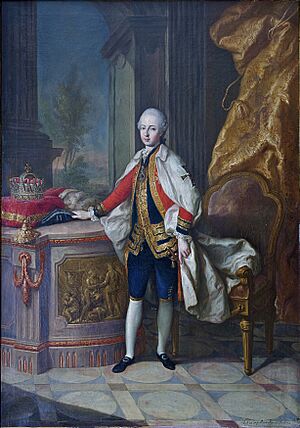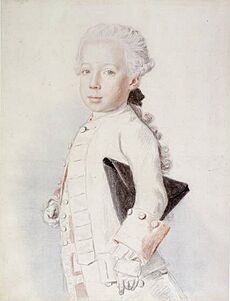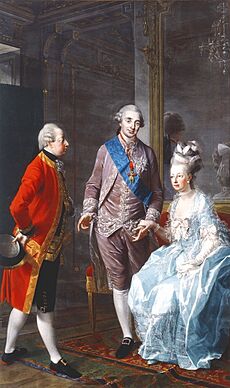Archduke Maximilian Francis of Austria facts for kids
Quick facts for kids Archduke Maximilian Francis |
|||||
|---|---|---|---|---|---|
| Archbishop-Elector of Cologne | |||||

Portrait by Anton von Maron
|
|||||
| Born | 8 December 1756 Hofburg Imperial Palace, Vienna, Archduchy of Austria, Holy Roman Empire |
||||
| Died | 27 July 1801 (aged 44) Hetzendorf Palace, Vienna, Archduchy of Austria, Holy Roman Empire |
||||
| Burial | Imperial Crypt, Vienna | ||||
|
|||||
| House | Habsburg-Lorraine | ||||
| Father | Francis I, Holy Roman Emperor | ||||
| Mother | Maria Theresa | ||||
| Religion | Roman Catholic | ||||
Archduke Maximilian Francis of Austria was an important historical figure. He was born on December 8, 1756, and passed away on July 27, 1801. He held two big titles: the Elector of Cologne and the Grand Master of the Teutonic Knights. He was the youngest child of Empress Maria Theresa and Emperor Francis I. He was also a very important supporter of the famous composer Ludwig van Beethoven when Beethoven was young.
Contents
Early Life and Important Roles

Maximilian Francis was born on December 8, 1756, in the Hofburg Palace in Vienna. This was also his father's 48th birthday! He was the fifth son and the youngest child of Francis I, Holy Roman Emperor, and his wife, Empress Maria Theresa.
In 1780, he took over from his uncle, Prince Charles Alexander of Lorraine. He became the Grand Master of the Deutscher Orden, also known as the Teutonic Knights. This was a very old and respected order.
In February 1775, Maximilian Francis visited his sister, Marie Antoinette, who was the Queen of France. When he arrived at the French court, he used a secret name, the Comte de Burgau, instead of his real title.
Becoming Elector of Cologne
In 1784, Maximilian Francis became the Archbishop and Elector of Cologne. He lived in the Electoral Palace, Bonn. He kept this important job until he passed away while living in exile.
As the Arch-chancellor of the Holy Roman Empire for Italy, he had a special role. He helped crown two emperors in Frankfurt: his brother Leopold II in 1790, and his nephew Francis II in 1792.
At the same time he became Elector of Cologne, he was also chosen for the Bishopric of Münster. He held his court in Bonn, just like other Archbishop-Electors of Cologne had done for centuries.
Supporting Young Beethoven
Maximilian Francis loved music and was a great supporter of artists. He had a court orchestra and musical group. Interestingly, Beethoven's father was a singer (a tenor) in this very group!
This meant Maximilian Francis played a big part in Beethoven's early career. Beethoven's grandfather, who was also named Ludwig van Beethoven, had been the Kapellmeister (music director) for the court.
Beethoven's Early Training
The court's organist, Christian Gottlob Neefe, was Beethoven's first important teacher and guide. Neefe saw how talented young Beethoven was, both as a performer and as a composer. He brought Beethoven to the court and suggested that Maximilian Francis hire him as an assistant organist.
Maximilian Francis also saw Beethoven's amazing skills. In 1787, he allowed Beethoven to visit Vienna to study with the famous composer Mozart. However, Beethoven's visit was cut short because his mother became very ill. We don't have clear proof that Beethoven actually met Mozart during this short trip.
Beethoven's Move to Vienna
In 1792, a new spa town called Godesberg opened, with a place called the Redoute. Beethoven played in the orchestra there. After a concert where Joseph Haydn was present, another trip for Beethoven to study in Vienna was planned.
Maximilian Francis continued to pay Beethoven's full salary. Beethoven went to Vienna to study with Haydn, Antonio Salieri, and other great musicians. The Elector was very interested in Beethoven's progress. Several reports from Haydn to Maximilian still exist, showing how much he cared.
The prince expected Beethoven to return to Bonn and continue working for him. However, due to big political and military changes happening, Beethoven never returned. He decided to stay in Vienna and build his career there.
End of His Rule

Maximilian Francis's rule over most of his lands ended in 1794. This happened when his areas were taken over by the troops of Revolutionary France. During the French Revolutionary Wars, both Cologne and Bonn were occupied by the French army in late 1794.
As the French soldiers got closer, Maximilian Francis left Bonn. He never returned. His lands on the left side of the Rhine river eventually became part of France. This was agreed upon in the Treaty of Lunéville in 1801. The Archbishop's court, where Beethoven had worked, stopped existing.
Even though Maximilian Francis still had some lands on the right side of the Rhine, he was very ill and overweight. He moved to Vienna after losing his capital city. He stayed there until he passed away at Hetzendorf Palace in 1801, at the age of 44. Because his court was dismantled, Beethoven's move to Vienna became permanent, and he no longer received money from the Elector.
Beethoven had planned to dedicate his First Symphony to his former supporter, Maximilian Francis. However, the Elector passed away before the symphony was finished.
The Electorate of Cologne lost its special status in 1802–1803 during a process called the German mediatisation.
Images for kids
-
Maximilian Francis at age 6 in 1762, painted by Liotard.
-
Maximilian Francis visiting his sister Marie Antoinette and King Louis XVI of France. Painting by Josef Hauzinger.



